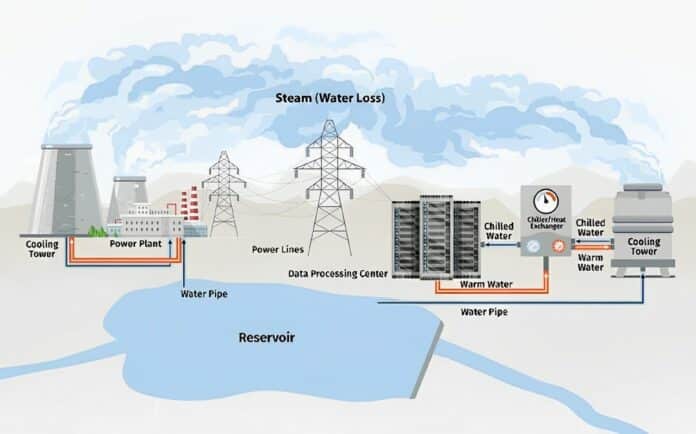New research by the University of California, Riverside, indicated that running some 20 to 50 artificial intelligence queries on cloud-hosted AI programs such as ChatGPT can consume roughly a half liter of fresh water from our overloaded reservoirs.
This is the first study that estimated the water footprint from running AI programs. Such programs rely on the cloud computations done in racks of servers in warehouse-sized data processing centers.
Google’s data centers in the United States alone required an estimated 12.7 billion liters of fresh water in 2021 to keep its servers cool.
As electricity flowing through semiconductors continuously generates heat, the hundreds of thousands of servers in data centers must be kept cool. This typically requires cooling systems connected to cooling towers that consume water by converting it into steam.
“AI training is like a big, very lawn and needs lots of water for cooling,” said Shoalei Ren, the study’s corresponding author. “We don’t want to water our lawns during the noon, so let’s not water our AI (at) noon either. We can’t shift cooler weather to noon, but we can store solar energy, use it later, and still be ‘green.'”
Researchers suggest a simple and effective solution – training AI models during cooler hours of the day so less water is wasted because of the heat generated.
The team estimated that a two-week training for the GPT-3 AI program in Microsoft’s U.S. data centers consumed about 700,000 liters of fresh water, nearly the same amount needed to construct around 370 BMW cars or 320 Tesla electric vehicles. The data centers also draw electricity from power plants that use large cooling towers that convert water into steam emitted into the atmosphere.
In the growing freshwater scarcity situation, increasing extended droughts, and rapidly aging public water infrastructure, the researchers believe that technology companies have to take steps to reduce water usage through cloud-based AI programs.

